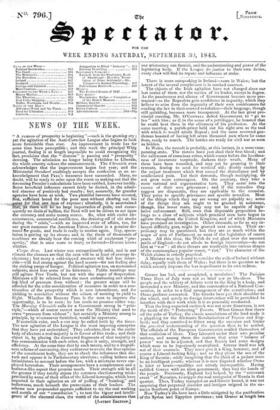There is more outspeaking in Ireland—more in Wales; but the
intent of the several complainers is in marked contrast.
The objects of the Irish agitation have not changed since our last notice of them, nor the tactics of its leader, except in degree. As the passiveness and silence of Government become more pro- tracted—as the Repeaters gain confidence in impunity, which they believe to arise from the ingenuity of their own contrivances for evading the law in their avowed revolution—their language, though still quibbling, becomes more transparent. At the last great pro- vincial meeting, Mr. O'CONNELL defied Government to "go to law" with him ; as if, in the sense of a pettifogger, he boasted that he could beat them in the chicanery of his profession. At the same meeting, a parish-priest held out his right arm as the tool with which he would attain Repeal ; and the same reverend gen- tleman boasted of having left seven thousand men where he came from, ready to march. The hordes are ready for civil war as soon as bidden.
In Wales, the tumult is probably, at this instant, in a more exas- perating state. The rioters have just shed their first blood; and the sullenness of conscious crime, which comes before the heedless- ness of inveterate turpitude, darkens their wrath. Many of them have been wounded, and may yet be groaning in their retreats, fearing to send for medical aid ; doubly excited by the unjust treatment which first caused the disturbance and by unalleviated pain. Yet their demands, though multiplying, do not grow more extravagant. On the contrary, they take a more rational and argumentative turn. They enter into the causes of their own grievances ; and if the remedies they suggest are disputable, they are applicable to the occasion. They point to specific grievances and specific remedies. Most of the things which they say are wrong are palpably so ; some of the things they ask ought to be granted in substance, • though, like lower rents, they may not be capable of' legis- lative enforcement. Still, even that disputable proposition be- longs to a class of subjects which practical men have begun to agitate throughout the United Kingdom, and of which Ministers have promised an investigation. Other demands, so far as any in- herent difficulty goes, might be granted next session. Their ex- pediency may be questioned, but they are as much within the scope of acts of Parliament as most of the legislation of recent years. All this time, the Welsh do not gloat over the assumed perils of England—do not allude to foreign interventiou—do not hint at " war" : all their threats are resolvable into various shapes of the commonplace popular resort, "riot." The character of the Welsh claims is strictly practical. A Minister may be bound to consider the evils of Ireland without delay, equally with those of Wales; but there is no question as to which country imposes the less impediment to its own redress.


























